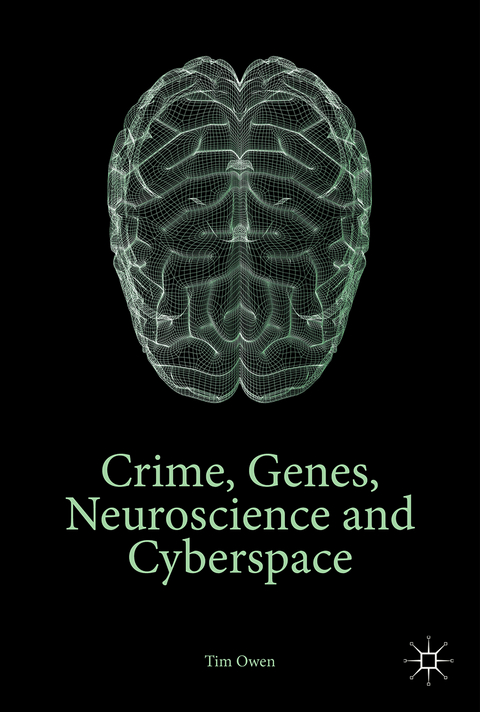
Crime, Genes, Neuroscience and Cyberspace
Seiten
2017
|
1st ed. 2017
Palgrave Macmillan (Verlag)
978-1-137-52687-8 (ISBN)
Palgrave Macmillan (Verlag)
978-1-137-52687-8 (ISBN)
This book applies Owen’s unique genetic-social framework to the study of crime and criminal behaviour, with an emphasis on cybercrime. Moving beyond challenges which confront contemporary criminological theorizing such as: the stagnation of critical criminology, the relativistic nihilism of the ‘cultural turn’, posthumanism, and virtual criminology, the author codifies and ‘applies’ the latest version of the framework to the study of crime, both in and out of cyberspace.
Drawing upon evolutionary psychology, behavioural genetics and the philosophy of Heidegger, he introduces new terms such as ‘Neuro-Agency’ and notions of Embodied Cognition into criminological theorizing. Adopting a soft compatibilist approach to free-will, and Realist ontology, Owen’s meta-theoretical focus provides a new direction for criminological theorizing, in particular in the direction of the conceptualization and prediction of cyber violence. Exciting and timely, this book willappeal to scholars and advanced students of criminology, law, sociology, social policy, psychology, philosophy, policing and forensic investigation.
Drawing upon evolutionary psychology, behavioural genetics and the philosophy of Heidegger, he introduces new terms such as ‘Neuro-Agency’ and notions of Embodied Cognition into criminological theorizing. Adopting a soft compatibilist approach to free-will, and Realist ontology, Owen’s meta-theoretical focus provides a new direction for criminological theorizing, in particular in the direction of the conceptualization and prediction of cyber violence. Exciting and timely, this book willappeal to scholars and advanced students of criminology, law, sociology, social policy, psychology, philosophy, policing and forensic investigation.
Dr Tim Owen is Senior Lecturer in Criminology and Director of Uclan Cybercrime Research Unit [UCRU] at the University of Central Lancashire, UK. He is the author of many articles, book chapters and books in criminology, sociology and social policy. Recent books include New Perspectives on Cybercrime, co-edited with Wayne Noble and Faye Speed (Palgrave, 2017).
Chapter One. Introduction.- Chapter Two. Criminological and Social Theory: Surveying the Contemporary Landscape.- Chapter Three. Neuroscience and Cybercrime.- Chapter Four. Do We Need a ‘Virtual Criminology’?.- Chapter Five. Cyber Violence.- Chapter Six. Codification and Application of the Genetic-Social Framework.- Concluding Observations
| Erscheinungsdatum | 14.10.2017 |
|---|---|
| Zusatzinfo | XIII, 232 p. |
| Verlagsort | Basingstoke |
| Sprache | englisch |
| Maße | 148 x 210 mm |
| Themenwelt | Naturwissenschaften ► Biologie ► Humanbiologie |
| Naturwissenschaften ► Biologie ► Zoologie | |
| Recht / Steuern ► Strafrecht ► Besonderes Strafrecht | |
| Recht / Steuern ► Strafrecht ► Kriminologie | |
| Schlagworte | behavioural genetics • codification • cybercrime • Cyber Violence • Deviance • Evolutionary Psychology • genetic fatalism • Genetic-Social Framework • postmodern relativism • Social Theory • Virtual Criminology |
| ISBN-10 | 1-137-52687-4 / 1137526874 |
| ISBN-13 | 978-1-137-52687-8 / 9781137526878 |
| Zustand | Neuware |
| Haben Sie eine Frage zum Produkt? |
Mehr entdecken
aus dem Bereich
aus dem Bereich
23 Techniken, um Stress abzubauen, Negativspiralen zu unterbrechen …
Buch | Softcover (2023)
FinanzBuch Verlag
CHF 25,20
produktiv sein ohne Stress – und mehr vom Leben haben
Buch | Softcover (2023)
dtv Verlagsgesellschaft
CHF 25,20
Wie Myrmecophile mit ihren Wirten interagieren
Buch | Softcover (2023)
Springer (Verlag)
CHF 97,95


